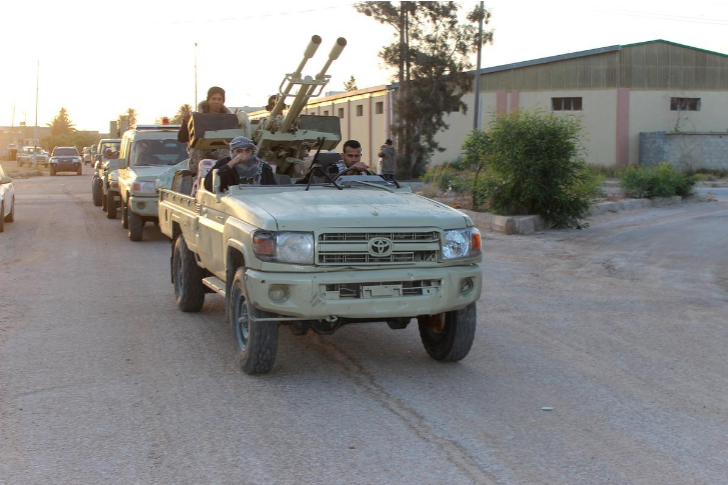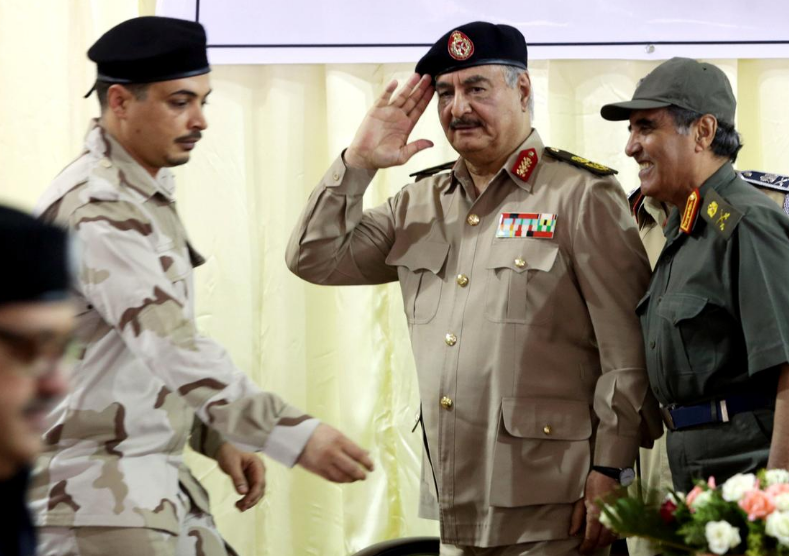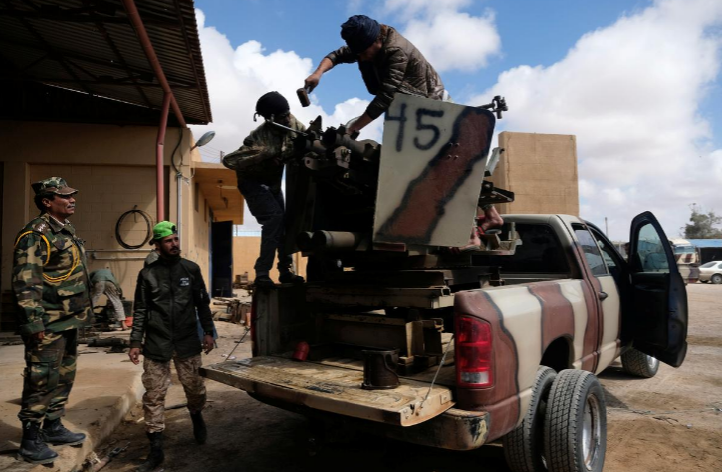After its operations in Syria, Turkey is preparing for a second foreign intervention in the Middle East.
This time it will be in Libya, a move which many regional and international governments oppose.
This is, for Turkey's Islamist President Recep Tayyip Erdogan, one of few remaining hopes to back other Islamist groups in the Middle East, regardless of the high cost of war, analysts argue.
Mohamed Abdelkader, Turkey expert at Al-Ahram Center for Political and Strategic Studies, pointed out that the Turks are thinking about "saving their Middle Eastern project to support Islamist movements."
"If Turkey loses Libya, it will lose North Africa as a whole. This is the case in light of the fall of the Muslim Brotherhood in Egypt and Omar Al-Bashir in Sudan and the military gains made by the Libyan National Army in Libya in its Tripoli campaign," he explained.
Libya has been divided between two forces since the 2011 uprising that led to the collapse of Muammar Al-Gaddafi's regime. The first is General Khalifa Haftar's Libyan National Army, which controls Benghazi and Libya's eastern regions, while the second is the Tripoli-based, UN-recognised Government of National Accord (GNA).
Haftar, who is increasingly receiving more international support, including that of Egypt, the UAE and Russia, launched a "decisive battle" to take Tripoli on 12 December. The main objective of Haftar’s operations in Tripoli is to capture the capital from the GNA. An earlier phase of the operations began last April.
The GNA, which is mainly backed by Turkey and Qatar, said "we are ready to push back" against Haftar's campaign, activating an agreement with Turkey on 20 December that entails sending Turkish troops to Libya whenever requested by the GNA.
The defence agreement was signed in November by both sides. They also then signed a memorandum of understanding on maritime demarcation, which ignores the territorial waters of some Greek islands such as Crete and Rhodes.
This escalatory move came following a meeting between the GNA's Prime Minister Fayez Al-Sarraj with Turkish foreign and defence officials in the Qatari capital Doha.
Erdogan, on 22 December, warned that Turkey "will evaluate all kinds of military support including ground, marine and air options if necessary."
The Turkish parliament voted 325-184 on Thursday in favour of a year-long mandate that facilitates the deployment of troops in the North African country to back the Tripoli-based government of Al-Sarraj.

Military vehicles of members of the Libyan internationally recognised government forces head out from Misrata to the front line in Tripoli, Misrata, Libya May 10, 2019. REUTERS
Aykan Erdemir, a former Turkish MP, told Ahram Online that Erdogan's three cross-border operations in Syria since 2016 "were long-term" ones that aimed at achieving both military goals and "building institutions under Turkish tutelage and engineering demography."
Erdemir, currently senior director of the Turkey Program at the Foundation for Defense of Democracies, said that Erdogan likely has similar plans for Libya, though believing that his ambitions will "be checked by the backlash to his Libya strategy back home."
"Given the Turkish electorate’s scepticism about risking Turkish lives in the Libyan civil war, Erdogan has so far built his strategy on using Islamist mercenaries that he has airlifted from Syria.
This strategy based on hired guns, however, is unlikely to succeed, forcing Erdogan to deploy Turkish troops, not only in advisory and training capacities, but also in combat roles. In Libya, growing involvement of Turkish troops in active fighting, and potential casualties from thereof, would exacerbate Erdogan’s legitimacy deficit and further undermine his support, already shaken by the ongoing economic crisis," he explained.
Taking into consideration that Erdogan's decision to "open a new front and spread forces thin between two challenging battlefields in Syria and Libya", Erdemir added, the Turkish president might also begin to see greater push back from Turkey's security establishment especially if the Libya campaign proves to be a "costly quagmire."
Tense relations with a long list of governments is a very likely consequence of armed intervention in Libya for Turkey.
Haftar gave a televised speech and said on Saturday that it was no longer a question of liberating Tripoli from the militias, but of "facing a coloniser." He accused Turkey of seeking to "regain control of Libya," a former province of the Ottoman Empire.
Libya's eastern-based parliament has rejected the Turkey-GNA deal to deploy Turkish troops.

FILE PHOTO: Libya's eastern-based commander Khalifa Haftar salutes as he participates in General Security conference, in Benghazi, Libya, October 14, 2017. REUTERS
The parliaments of Egypt, Saudi Arabia, the UAE and Bahrain also issued a joint statement on Friday to condemn Turkey's "violation of the rules of international law, and … assault on the independence of Libya and integrity of its land." The Arab parliament also adopted the same stance.
Greek Prime Minister Kyriakos Mitsotakis, Israeli Prime Minister Benjamin Netanyahu and Cypriot President Nicos Anastasiades jointly warned that "this decision constitutes a gross violation of the UNSC resolution...imposing an arms embargo in Libya and seriously undermines the international community’s efforts to find a peaceful, political solution to the Libyan conflict."
Russia expressed its concern over Turkey's military plans, while US President Donald Trump, stated that "foreign interference is complicating the situation."
Following a phone call between them in April, Trump "recognised Field Marshal Haftar's significant role in fighting terrorism and securing Libya's oil resources, and the two discussed a shared vision for Libya's transition to a stable, democratic political system."
US officials, including White House deputy national security adviser Victories Coates, also met the eastern Libyan commander in November to discuss "steps to achieve a suspension of hostilities and a political resolution to the Libyan conflict."
Lenore Martin, associate for Harvard’s Centre for Middle Eastern studies, explained that Turkey has three motives to fight in Libya.

Members of Libyan National ARmy (LNA) commanded by Khalifa Haftar get ready before heading out of Benghazi to reinforce the troops advancing to Tripoli, in Benghazi, Libya, April 13, 2019 REUTERS
Firstly, Erdogan believes that closer ties with Al-Sarraj will open business opportunities for Turkey in a country that has the ninth largest oil reserves in the world. “Turkey is an energy-importing country and its economy and unemployment has been under increasing pressure. Therefore Turkey is looking for investments and employment for its people. Turkey’s trade volume is increasing and was expected to reach 1.6 billion dollars by the end of 2019," said Martin.
She also stated that Turkey hopes to "create a problem" for Cyprus, Greece and Israel's subsea pipeline deal that was signed on 2 January through its maritime demarcation deal with Al-Sarraj.
The third reason is to offer support for the GNA that is supported by Islamist militias.
"Ankara has taken a clear position in Libya, just as it did in Syria. It is a precarious position. Libya has devolved into a very messy civil war without a clear outcome in the near future. Just as Turkey has not benefited from its troop deployments in Syria and its support of opposition forces there, it is not clear that Erdogan’s policies in Libya will be any more successful. Turkey has thrown its chips onto the table and time will tell if it will be a winner," the Harvard scholar concluded.
Short link: